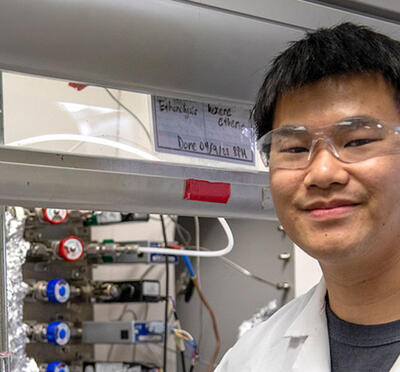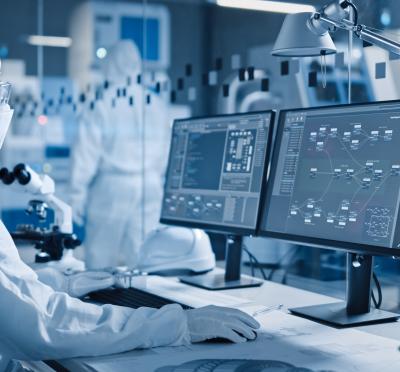Derek Dardzinski, a chemical engineering Honors College senior, was recognized this fall as one of the “Future Leaders in Chemical Engineering,” at an October symposium hosted by North Carolina State University.
The award includes travel costs to attend and present a research poster at the symposium. Dardzinski presented research into molybdenum disulfide’s potential as a low-cost catalyst for the hydrogen evolution reaction, which could prove useful as the world looks for cleaner, more sustainable sources of energy.
“It was a tremendous experience,” Dardzinksi said. “I’m really glad I got the chance to participate. I already knew by the time I came to Oregon State that I wanted to go to graduate school, but this really cemented my decision to pursue a career in research.”
Dardzinski applied for the award at the suggestion of Greg Herman, school head and James and Shirley Kuse Chair in Chemical Engineering. Herman has mentored Dardzinski in his lab ever since he came to Oregon State as a transfer student in summer 2018. Herman says Dardzinski’s experience demonstrates the value of experiential education in preparing students to become future leaders in engineering.
“Derek showed real initiative in reaching out to me before he even started here as a student,” Herman said. “He was eager to get hands-on lab experience, and we found a suitable project and put him to work. He has worked in my lab during the academic year and over the past two summers. Derek has shown both dedication and a real aptitude for research, and has already begun to branch off into other exotic fields of computational research.”
Originally from the Seattle suburb of Woodinville, Washington, Dardzinski was recruited out of high school to play baseball at Linn-Benton Community College. After two seasons as an outfielder, Dardzinski figured he had gotten the most out of athletics that he could. So he turned his attention to engineering full time.
“I had always been drawn to engineering growing up, but I wasn’t settled on what kind of engineer I wanted to be,” he said. “I have always enjoyed making things, building things, taking them apart and putting them back together. I’m fascinated by the application of math and science to solve problems, so engineering seemed like a natural fit.”
Dardzinski says Ahmad Rajabzadeh, a physics teacher, encouraged his academic pursuits. But he credits Bridgid Backus, his organic chemistry teacher at LBCC, with inspiring him to get involved in research and to give graduate school serious consideration.
“He has a genuine curiosity about science and a true desire to learn,” Backus said. “Research will come naturally for him.”
Although Dardzinski was initially inclined toward mechanical engineering, another LBCC instructor, Brian Reed (’06 Ph.D., Chemical Engineering), steered him toward chemical engineering, specifically at Oregon State, instead.
“Derek is the kind of student that makes mentoring easy,” Reed said. “He was always well prepared, genuinely interested in getting the most out of his education, and always eager to embrace a challenge.”
Dardzinski says the courses he took at LBCC more than adequately prepared him for success at Oregon State.
“There are many reasons people might choose to attend a community college rather than head straight into a four-year university,” he said. “But one thing you will find is that everybody is there because they choose to be there. And, in terms of the quality of instruction, it’s really a great value. I had some of the best teachers at LBCC.”
Dardzinski will graduate in June and plans to head to graduate school next fall to pursue a doctorate in materials science.


